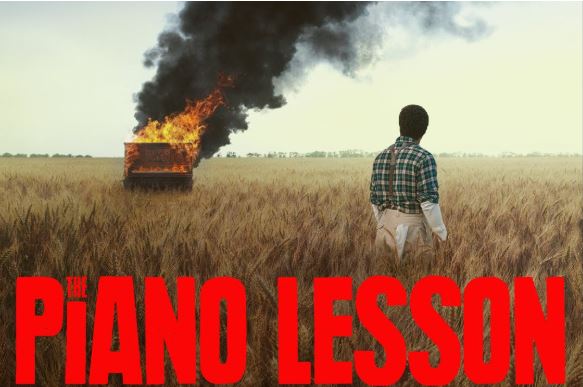The Piano Lesson is a powerful and emotionally resonant drama that brings August Wilson’s Pulitzer Prize-winning play to life on the big screen. Set in Pittsburgh during the aftermath of the Great Depression, the film explores the tension between two siblings, Boy Willie (John David Washington) and Berniece (Danielle Deadwyler), over the fate of a family heirloom piano. This piano, intricately carved with the history of their enslaved ancestors, becomes a symbol of family legacy, identity, and struggle. Directed by Malcolm Washington in his feature debut, the film is a moving, thought-provoking portrayal of the conflicts between heritage and ambition, tradition and progress, memory and future.
The story begins when Boy Willie arrives in Pittsburgh with his friend Lymon (Ray Fisher), carrying a truckload of watermelons to sell. They stay with Boy Willie’s uncle, Doaker (Samuel L. Jackson), and sister, Berniece, who lives in the family home with her young daughter, Maretha. Boy Willie’s goal is to sell the heirloom piano to buy a piece of land previously owned by the Sutter family, their ancestors’ former enslavers. However, Berniece firmly opposes selling the piano, seeing it as a sacred representation of their family’s history. The piano, carved with images of their enslaved ancestors, was acquired in a painful exchange—one of their ancestors was traded for it.
The story’s emotional core lies in this dispute. Boy Willie argues that holding onto the piano does nothing to improve their lives, while Berniece believes selling it would sever their connection to their family’s legacy. Their opposing viewpoints lead to intense, emotional clashes, with the piano serving as a powerful metaphor for the family’s unresolved trauma and struggle for identity.
Malcolm Washington’s direction captures the essence of the original play while infusing it with cinematic touches. The majority of the story takes place within the confines of a single house, giving the film a theatrical feel. This approach creates an intimate atmosphere, making the audience feel like they are part of the family’s heated arguments and emotional moments. While some viewers may find this stage-like style jarring, it ultimately serves the narrative well, allowing the characters and their emotions to take center stage.
The performances are a standout aspect of The Piano Lesson. Danielle Deadwyler delivers an extraordinary portrayal of Berniece, a widow carrying the weight of her family’s painful past. Her nuanced performance captures Berniece’s grief, strength, and deep connection to her heritage. She makes the audience feel the depth of her internal struggle, especially as she wrestles with the decision to preserve the piano or let it go.
John David Washington gives a dynamic performance as Boy Willie, portraying a man driven by ambition but torn by his family’s history. His energy and determination contrast with Berniece’s quiet resolve, creating a compelling dynamic between the siblings. Washington effectively conveys Boy Willie’s belief in using the piano as a tool for progress while dismissing its emotional significance.
Samuel L. Jackson brings wisdom and gravitas to the role of Doaker, the family’s elder. His character serves as a mediator in the conflict, and Jackson’s understated performance ensures his presence is felt even in quieter moments. The supporting cast, including Ray Fisher as Lymon, adds depth to the story, and Olivia Washington delivers a touching performance in her smaller role.
One of the film’s most memorable scenes occurs when the men gather around a table and break into the prison song “Berta Berta.” This spontaneous, soulful moment encapsulates the shared struggles of the characters and their connection to the past. It’s a haunting and powerful highlight that stays with the audience long after the scene ends.
Thematically, The Piano Lesson delves into the importance of honoring one’s heritage while also looking to the future. The film explores how history shapes identity and the tension between preserving memories and moving forward. Malcolm Washington skillfully blends these themes with supernatural elements, adding layers of intrigue and depth to the narrative.
With its stellar performances, emotionally charged story, and thoughtful direction, The Piano Lesson is a remarkable debut for Malcolm Washington. While its theatrical tone may not resonate with everyone, the film’s exploration of family, legacy, and identity makes it a profound and unforgettable experience. It’s a poignant reminder of the importance of honoring the past while forging a path to the future.
Plus Points:
- Powerful performances, especially by Danielle Deadwyler and Samuel L. Jackson.
- Thought-provoking story exploring family, legacy, and identity.
- Faithful adaptation of August Wilson’s Pulitzer-winning play.
- Intimate, theatrical atmosphere enhances emotional depth.
- Memorable scenes, like the “Berta Berta” prison song.
- Skillful blend of supernatural elements with historical context.
Minus Points:
- The stage-like style may not appeal to all viewers.
- Limited settings can feel restrictive.
- Slightly extended runtime may test patience.
- Some characters lack deeper development.
The Review
The Piano Lesson is a deeply moving drama about family, legacy, and identity. Anchored by exceptional performances from Danielle Deadwyler and Samuel L. Jackson, it combines emotional depth with a haunting atmosphere. While its theatrical style might not suit everyone, the film remains a powerful, thought-provoking adaptation of August Wilson’s play
Review Breakdown
-
User Rating

